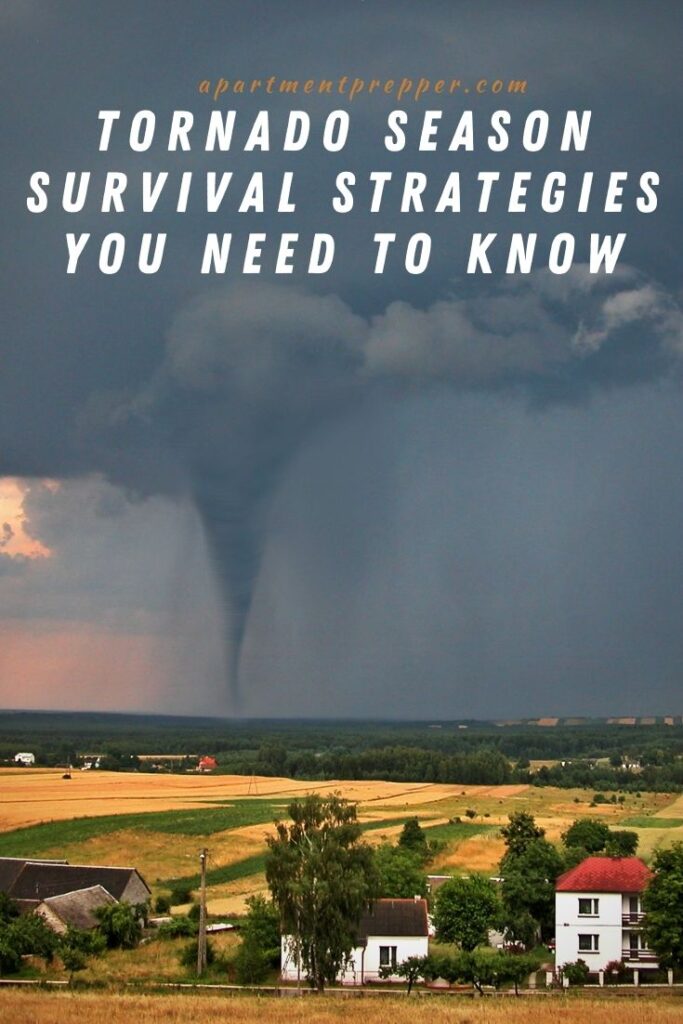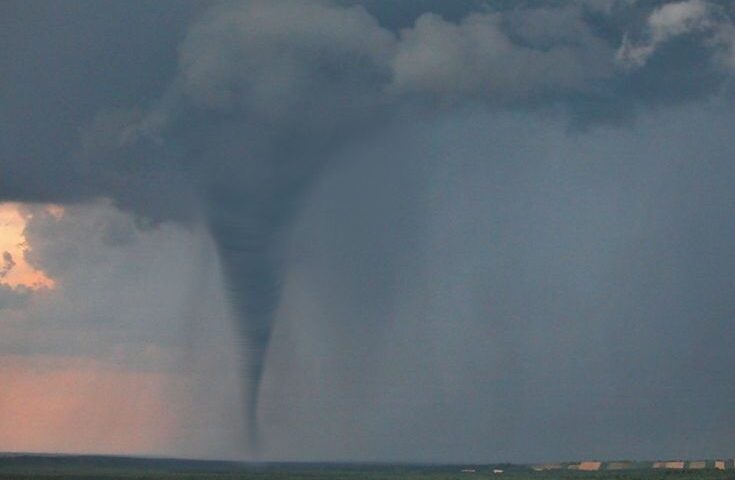(Editor’s note: Weather forecasters are predicting above normal tornado activity this year. There is also a possibility that La Nina patterns (cooler than average waters in the central Pacific Ocean) may contribute to severe weather and extreme tornadoes. We hope these predictions don’t come to pass, but it’s best to be prepared. Our guest writer Dan Vale has experienced a close encounter with a tornado. A big thank you to Dan for sharing this article!)
Written by Dan Vale
I was a ten-year old boy at home alone, and I encountered a terror I will never forget. The tornado was rushing straight at our second-floor apartment. Then, it seemed to bounce over our apartment at the last minute. Next, it tore the roof off the apartment across the street from our apartment. I had been under my bed praying. This experience was why I became a prepper.
Tornado season, when most tornadoes occur, stretches from March through June. Nevertheless, tornadoes have been documented in every month of the year. The U.S. has more than 1,200 tornadoes annually.
Even though the southeastern and plains states have the most tornadoes, there have been tornadoes in most of our states. Thus, tornadoes are worthy of serious preparations, and this article will discuss how to prepare.
Get weather alerts
Local radio and TV stations and especially NOAA radio will broadcast tornado watches (conditions favorable for a tornado) and warnings (a tornado detected). Although television sets also give weather alerts, the TV is not always on, and it is not portable. Regular radio reports are not as up-to-date or as dependable as NOAA radio alerts. If you use a NOAA radio, you are alerted to weather and other environmental dangers in your specific area code.
To prepare for possible power outages, gather batteries and charging devices to power your radios, computers or smart phones so you can listen to this weather information.
It is important to program into your cell phones all the emergency phone numbers you might need. Make sure that everyone in your family knows how to text, because texting might become your most reliable form of communication.
When to evacuate
If a tornado warning is in effect, it is time to act. Flee to a local emergency shelter. If that is not practical, move to the basement of your apartment. If that is not an option, move to the interior of your apartment as far from windows as possible. Try to stay under a sturdy desk or table.
If you are riding in your car and cannot avoid the tornado, keep buckled in your seat belt and lay your upper body on the passenger seat while covering your neck and head with your arms. If you have time, flee to a ditch or to any ground depression and cover your neck and head with your arms.
The most common injuries that survivors receive from tornadoes are severe cuts and bruises from debris hurled at deadly speeds. Also, downed power lines in pools of water are an electrocution hazards. Having a good first aid kit available is important. In addition, knowing how to perform cardiopulmonary resuscitation also is valuable.
After a tornado, transportation on roads might be impossible or dangerous. Thus, you should have a least a three day supply of food, which should be no problem for a prepper.
If there is a power outage, battery powered lanterns are safer than candles. A candle can tip over and cause a fire. A candle also is more dangerous if there has been a gas leak from a ruptured gas line.
The aftermath
Even after a tornado has passed, there still are dangers to avoid. Preppers who make it through a tornado might be relieved and make the mistake of believing that danger is no longer present. They might be suffering from cabin fever and will be curious about the scope of the damage caused by the disaster in their city. Venturing out in this frame of mind could be dangerous. For example:
1. Stressed, distracted motorists will be rubbernecking to see the tornado damage.
2. Walking through a wrecked building can result in your stepping on a nail or having an unstable structure collapse on you.
There also are “storm chaser” criminals who can further victimize those who already have suffered from the tornado. Criminals know that, during power blackouts, lights and burglar alarms are off and police are overextended. They also know that tornado victims are stressed and not thinking clearly. Some examples of their activities are:
1. Requests for disaster victims’ personal identity information by scammers posing as FEMA agents.
2. Promises by bogus insurance agents to get larger insurance settlements if disaster victims will sign a contract giving these imposters a percentage of these promised settlements.
3. Requests by scam artists that fortunate people, who were not ravaged by the tornado, should give them donations for fake charities that they say will benefit tornado victims.
If your apartment has been extensively damaged by the tornado, you might be able to arrange to stay in a motel or with relatives or friends until your apartment has been repaired. If you do this, make sure you secure your valuables in commercial storage spaces so that looters will not rob you. To facilitate the repairs and your compensation for them, try to use a camera or video recorder to document the damages to your apartment.
My wish is that you never will have to experience a tornado as I experienced one. If you do, I hope that you will profit from my experience and the advice in this article.
About the Author:
Dan Vale has a Bachelor Degree in Physical Education. He won the Mr. Delaware Bodybuilding Contest in 1968 and earned his karate Black Belt in 1973. He has had a lifelong interest in physical fitness. Furthermore, for over seven years, he wrote 785 of articles for the Examiner Online Newspaper. Most of these articles were written in his capacity as the Baltimore Prepper Examiner. To see his Amazon books, visit his Amazon author page.
We are an affiliate of Amazon.com, which means we received a small commission if you click through one of our Amazon links when you shop, at totally no cost to you. This helps keep the lights on at the blog. Thanks!


